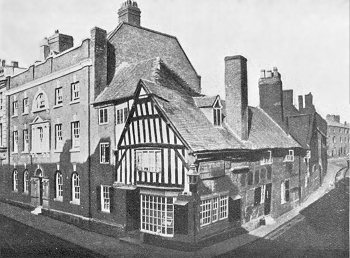The Old Bakehouse, Victoria Street The premises now occupied by Mr. H. Hughes can without a doubt be numbered amongst the oldest in our town, and there are now in his possession deeds which take us back over 200 years. According to these documents, the premises possessed a license, and was called "The Bottle," the license being afterwards transferred to premises nearly opposite, with the extended title of "The Hand and Bottle." The house afterwards became a bakery, the proprietor being Mr. Mills; who was succeeded in 1830 by Mr. James Taylor, followed by his son, Mr. Jno. Taylor, in 1858, and by the present proprietor, Mr. H. Hughes, in 1871. Before the repeal of the Corn Laws, the side window in John's Lane, as shown in our illustration, was known as "Bread Riot Window." People would assemble round this window at four o'clock in the morning, and wait till half-past ten for a loaf, for which they would have to pay no less a sum than 2s. 10d. Truly a starvation price. It was at this time, 1839, that the poet, Ebenezer Elliott, better known as the "Corn-Law Rhymer," composed the following song:-
Over the front window of this ancient structure "A.D. 1300'' is inscribed, and another peculiar feature is the "herring bone" style of brick-work assumed by builders some 500 years ago, whilst the diamond-pane windows add to the evidence of its antiquity.
The one document is evidently a bill for 6s. 6d., and is fairly decipherable, the other being absolutely a Chinese puzzle. The readable paper is dated October 27, 1682, and seems to have reference to one William Shenton, of Wolverhampton, and the desire for a messenger to be employed by a John Henry James, in Cheshire, for the sum of 6s. 6d., upon the account of "some goods sent down into Cheshire " to Labby Hall, "for and on account of Colonel Francis Pigott". A Mr. Peter Hodgkinson seems to have duly received the money, and appended is an acknowledgement of the receipt. The front room of the house in John's Lane adjoining the shop must have been of a peculiarly draughty character, for it possessed no less than eight doors, two of which led to cellars and four to chambers above. Needless to say, there was little space for wall decorations, more especially as the room also included two cupboard doors. The merchant's warehouse above was built by Mr. Thomas Perry, who resided in the substantial looking dwelling-house adjoining the old shop in Victoria Street, and was succeeded by his son, William Perry. The property afterwards came into the possession of Mr. Perry Herrick of Beaumanor Park, Leicester, who reputed to be the richest commoner in England. At his death, Dr. John Talbot Cartwright became the occupier, followed by Dr. Bond Moore. The property was then purchased by Mr. H. Hughes. There is rather a good story told of old Mr. William Perry. Returning home rather late one evening, he found a lad crying on his doorstep, and upon inquiring the cause, learned that the lad had lost a farthing. He summoned his footman, and bade him bring a wax candle. The three hunted for the lost farthing until the candle had burnt itself out, and then the old gentleman told the lad to go home. He did not, however, think to give the boy a copper, although he had wasted a candle, which in those days must have cost 2d., in searching for a farthing! |




